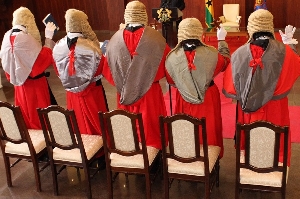The rich cultural diversity in Ghana provides the perfect platform for traditional rulers to use the celebration of festivals to articulate their views and tell managers of the economy their needs in the short and long term.
In the past, traditional leaders were in charge of their communities and ensured the progress of the people of their respective traditional areas.
During such festivities, they welcome their subjects home and take stock of their lives over the past year, and pray for the safety and good health of their citizens.
One such festival is Kundum, which is celebrated by the chiefs and people of the Eastern Nzema Traditional Area.
Awulae Amihere Kpanyile
At this year’s Kundum festival, Awulae Amihere Kpanyile III, the Paramount chief of the traditional area will welcome the entire nation to Atuabo, the new Gas City, to celebrate on the theme: “Tradition, our heritage — Sustainable Economic Development through the protection of our environment.”
Uniqueness of the festival
This year’s Eastern Nzema Kundum started from October 5 and will end tomorrow, November 1, 2015. It is said to be one of the most unique for the chiefs and people, since it is being celebrated at the peak of the rise of Atuabo to “modernity.” The citizens are, therefore, expected to use the occasion to discuss social issues to ensure proper development and environmental sustainability.
Atuabo caught the corporate eye when the people decided to play host to various facilities that were giving meaning to the diversification of oil and gas resources.
Many companies in the oil industry began siting their offices in the locality. Prominent among the companies are the Atuabo Gas Processing Plant, managed by the Ghana National Gas Company; the gas loading gantries at Annochi and Atuabo Free Port Project owned by Quantum Terminals as well as siting of the ENI-Sankofa onshore facility.
With the emergence of these facilities in the area, there is no doubt that the lives of the people and the celebration of Kundum would not be the same anymore.
That is why the chiefs and people selected the theme for the celebration to hinge on sustainable economic development.
With the development of the area, with star-rated beachfront facilities raising the standard of living of the people, the communal way of life is giving way to a system of individualism.
Unplanned land
Interestingly, the development of these industrial structure and hospitality facilities is coming up at a time when the districts do not have spatial planning in place to zone the areas, giving rise to unplanned development.
Developers have acquired land from families and for the mere fact that they own the title to the land, they begin work without recourse to what the facility would be used for and this has resulted in indiscriminate development.
Awulae Amihere Kpanyinli intends to use this year’s Kundum celebration to highlight why there can be no development without proper spatial planning.
Kundum
According to Adolf Sagari Nokoe, an Nzema historian, the festival came at a time when the people, predominantly farmers and fisher folks, had bumper harvest of foodstuffs, fish and a lot of success on the land.
“To us, the festival is seen as an agrarian commemoration and related to the goddess of fertility and also as a religious significance, where sacrifice is offered to our ancestors,” he said.
From its inception in the 17th Century, Mr Nokoe said, Kundum had been certified as one of the old festivals celebrated by the people in the southern part of the Western Region.
Ban on drumming and dancing
The celebration starts on October 5 and from Ankobrah, with the observation of a period of quietness – no drumming and dancing.
Also, those who are bereaved cannot hold the funeral of their beloved ones in full during this period.
This period of quietness is also used as a moment for reconciliation, when the people at the family, group and community levels make peace.
Activities
Other activities include showcasing the traditional food of the Nzema, with people arriving from the diaspora to join the celebration.
According to Awulae Amihere Kpanyinli, there will be a forum for second-cycle institutions.
“The forum will relay the history of the people of Nzemamanle and also tell the story of Kundum from the perspective of the people of Nzema and why it is important not to forget our roots and hold on to the culture and heritage of the forefathers,” he said.
He said with the current cultural imperialism backed by foreign media, if nothing was done to educate the young ones of today, they would not have a story to tell.
He said it would be best to ensure that the people from the region and other parts of the country join in celebrating the beauty of Kundum.
Kundum Saturday and Sunday
After the observance of the rites, reunification and other activities for the day, there will be a durbar at the Atuabo Durbar Ground to climax the celebration.
On Sunday, final rites will be performed to invoke success for the people of Nzemamanle and the entire country.
The celebration will then move to Western Nzema, after which it will be handed to the people of Cote d’Ivoire, who celebrates a semblance of Kundum.
Town
Atuabo is one of the beautiful coastal towns in the Western Region, inhabited by industrious and united people and with a very rich history and culture. The people are mostly farmers and fishermen.
With the town currently hosting the onshore gas processing plant, it has become very strategic in the country, but activities of the residents are caught in the midst of unplanned development.
Although the development will lead to the creation of more jobs for the people, there is the need for them to be regulated to forestall any difficulties in future.
Opinions of Sunday, 1 November 2015
Columnist: Dotsey Koblah Aklorbortu














